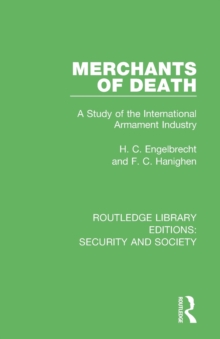
Genetic Seeds of Warfare : Evolution, Nationalism, and Patriotism PDF
by R. Paul Shaw, Yuwa Wong
Part of the Routledge Library Editions: Security and Society series
Description
For millennia humanity has simultaneously deplored and waged war.
With each conflict the stakes have risen, and we now face global annihilation for the sake of a practice all the world claims to condemn.
Is there some seemingly irresistible force that impels us toward our own destruction?To explain this central paradox of human behaviour, Genetic Seeds of Warfare, originally published in 1989, advances a startling new theory.
It traces the origins of warfare back to early groups of Homo sapiens in competition for scarce resources, showing that warfare evolved as these groups evolved: kin-group against kin-group; tribe against tribe; nation against nation.
Rather than being tied to a specific gene, warfare emerged as one of many behavioural strategies for maximising genetic survival.
As social groups became more complex, motivations for warfare developed from simple protection of blood relations to political appeals to shared ethnicity, religion, and national identity.
But the ultimate cause of warfare is rooted in the most basic of human drives: the need to ensure that one’s genes will survive and reproduce. The authors challenge many assumptions about human behaviour in general, and warfare in particular.
They convincingly present the case for an evolutionary understanding of the propensity for warfare, supporting their argument with data from a vast array of social and natural science research.
In doing so, they reveal why previous attempts at ending war have failed, and make proactive suggestions toward the development of a new agenda for world peace.
Information
-
Download - Immediately Available
- Format:PDF
- Pages:288 pages
- Publisher:Taylor & Francis Ltd
- Publication Date:22/12/2020
- Category:
- ISBN:9781000258790
Other Formats
- Hardback from £99.99
- Paperback / softback from £26.35
- EPUB from £25.19
Information
-
Download - Immediately Available
- Format:PDF
- Pages:288 pages
- Publisher:Taylor & Francis Ltd
- Publication Date:22/12/2020
- Category:
- ISBN:9781000258790










